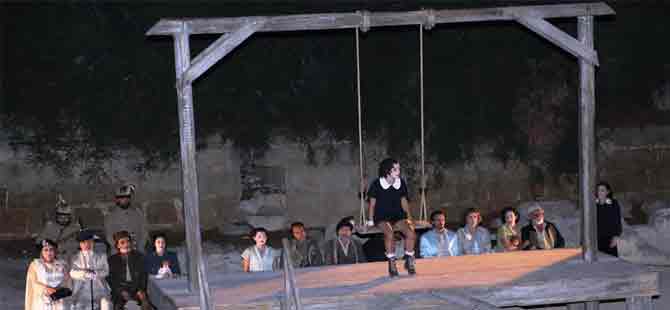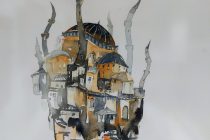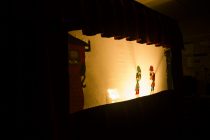For the second year running, a Greek play was staged at the ancient amphitheatre in Salamis, northern Cyprus. A 4,000 capacity audience watched the stunning performance of Antigone on Wednesday 28 Sept.
Written by Sophocles around 441BC, this famous Greek tragedy was jointly produced by the National Theatre of Greece, the State Theatre of Northern Greece, and the Cyprus Theatre Organisation (THOC).
Before the play commenced, THOC chairman Yiannis Toumazis told the audience: “We are blessed to be in a position to enjoy Antigone, a masterpiece by the great ancient Greek playwright Sophocles, right here at the centre of Cyprus` culture and civilization, performed by actors and actresses from the three Greek-speaking state theatres, directed by Stathis Livathinos”.
Serdar Atai also said a few words on behalf of the Famagusta Walled City Association (MASDER), which assisted the staging of production. He welcomed the guests, which included culture and art lovers, peace volunteers, and the “beautiful people of our beloved Famagusta”.
Antigone was performed in Greek with Turkish and English surtitles. Its performance followed that of Hippolytous, which played to another capacity audience in 2015. The two productions mark the first time Greek plays have been staged at the amphitheatre in Salamis, Famagusta, since the 1974 War in Cyprus.
This year, some 24 coaches carried Greek Cypriots to the venue from South Cyprus, while hundreds more made their journey direct to the venue. They were joined by Turkish Cypriots, foreigners and diplomats to watch the two-hour long performance.
Talking to the Cyprus News Agency afterwards, Toumazis said this was an historic moment both for Cyprus theatre and the island in general. The amphitheatre at Salamis “is one of the most important theatres of Cyprus, one of the cradles of our civilization.”
“Greek Cypriots and Turkish Cypriots watched this performance together, which carries the message that love rules and the universal, ecumenical laws of gods and humans prevail over any structure or authority.”
When asked about the future of the Greek plays at Salamis, Toumazis said they had taken place with the support of the UN Bi-Communal Technical Committee for Culture. Their aim was, “to bring the two communities closer together, for the reunification of our country.” Toumazis added, “I hope that we will not need to stage many more performances this way. I hope that we all will live in a united Cyprus.”
Androulla Vasiliou, former first lady and co-chair of the bi-communal committee for culture, which helped organise the production in the ancient theatre was “an opportunity to introduce Turkish Cypriots to ancient Greek culture”.
Greek Cypriot politicians angry play staged in TRNC
Not everyone in South Cyprus was pleased about last week’s production of Antigone at Salamis. Several political parties and individuals condemned the decision to perform the play in the TRNC, which they view as “occupied”, claiming it was tantamount to “political recognition” of the breakaway regime.
Among those vocalising their anger were opposition parties DIKO, EDEK, Solidarity, and the far-right ELAM. As with last year’s play at Salamis, the Greek Cypriot organisers, actors and audience were accused of being ‘traitors’.
According to a report in the Cyprus Mail, DIKO party leader Nicolas Papadopoulos was among those to criticise the play, claiming it ‘undermined the Republic of Cyprus’. Prominent lawyer Chris Triantafyllides, who is a member of the ruling DISY party and on the President’s negotiating team, was equally scathing.
“In the guise of culture, tonight we ‘enslave’ Antigone, too,” he tweeted. “It is an example of a pathetic message of compromise with occupation.”
However, a protest by the dissenters outside the Greek embassy in Cyprus had a “paltry turnout” with only 50 people attending.
Main photo of Antigone from Detay Kibris




